SIERRA LEONE
Summary of SRI in Sierra Leone
SRI began in Sierra Leone when World Vision/Sierra Leone sent one of its agricultural staff to Madagascar in November 2000 to learn about SRI from Association Tefy Saina (see Sierra Leone report in Sanya conference proceedings). SRI has continued to gain traction in Sierra Leone in areas where rice is cultivated.
The West African Rice Company (WARC) was started in 2011 by two Argentinians who moved to Sierra Leone to build up the country's commercial rice sector as a means of alleviating poverty. A video about Emiliano Mroue, one of WARC's founders, is available on YouTube. In early 2013, WARC commissioned a study by Columbia University's School of International and Public Affairs (SIPA) to evaluate and give recommendations for their nascent outgrower development model. (See SIPA report).
Information on SRI in Sierra Leone was presented at a Regional Workshop on System of Rice Intensification of (SRI), which was held in Ouagadougou, Burkina Faso, on July 26 and 27, 2012. Sierra Leone was represented by Samuel Soki Harding, Daniel Santigie Fornah and Edward S. A. Kargbo at the workshop, which was organized by the West and Central African Council for Agricultural Research and Development (CORAF/WECARD), the National Center of Specialization for Rice (WAAPP Mali) and SRI-Rice (Cornell University) within the framework of the West Africa Agricultural Productivity Program (WAAPP); Oxfam America sponsored participation for civil society representatives.
In March 2013, Gerald Aruna, Country Director for the Italian NGO ENGIM International, started the Swamp Development Project as a mixed rice and vegetable production system, using SRI rice followed by vegetables in an inland valley swamp system. Aruna has also been involved in providing Farmer Field School-based trainings for extension workers, farmers and CRS staff as the NGO incorporates SRI into their rice value chain work (Integrating Savings and Agricultural Development II) in the Kailahun and Koinadugu Districts, and with the Centre for the Coordination of Youth Activity (CCYA) in the Bombali District. Aruna also authored a CRS training manual for facilitators which was used for the trainings.
According to a World Bank article, about 10,865 Sierra Leone farmers had adopted the SRI as of June 2014. SRI adoption increased in the as the project Improving and Scaling up the System of Rice Intensification in West Africa, which formally began in January 2014, gained momentum. The SRI-WAAPP map, which is current as of 2016, shows over 40 sites where farmers have received training. A 2016 article highlights the success of SRI-WAAPP in Sierra Leone.
During the 2015 Ebola crisis, Gerald Aruna reported that SRI promotion efforts had to be adjusted to give priority to national and local efforts to stem the spread of the Ebola virus. In some of the communities with which he has been working on SRI demonstrations had been very seriously affected by the spread of the disease. Gerald and associates have been providing medical supplies and personal protective equipment with support from Italian Cooperation funds. Social mobilization campaigns to contain the virus have been carried out in 40 communities, holding focus group discussions for community members of all ages and giving them Ebola virus disease (EVD) education.
A 2017 Agronomie Africaine article assessing SRI in the Mangrove Associated Swamps (MAS) showed enriched basic SRI gave an average yield three times greater than the average yield obtained with current farmer practices (6.2 and 2.0 t/ha) and was most economical.
Videos of SRI in Sierra Leone can be found on YouTube SRI-Rice channel Africa playlist and the Flooded Cellar Productions System of Rice Intensification playlist, which includes a video of Gerald Aruna's work with SRI in Mendesora village. During December 2019, the Annual Chairperson's Award was given to Pa Foday Kanu of Medesora Village in Koya Chiefdom for his work with SRI. During 2016, Aruna adapted SRI methods for growing the leafy krain krain vegetable. (See article on the System of Krain Krain Intensification, SKKI). During 2017, he obtained support for an SRI project in six communities (see details). During 2019, with Aruna's help, ENGIM Internazionale obtained funding to begin a three-year project that may include the System of Onion Intensfication, which is based on SRI methods. In October 2021, the Adaptation Fund approved the SRI-based “Scaling up Climate Resilient Rice Production in West Africa” (RICOWAS) project which includes Sierra Leone and 12 other countries in the region.
Progress and Activities
2023 Updates
- Launching of the RICOWAS Project: Paving the Way for Climate-Resilient Rice Production in Sierra Leone
[October 19, 2023] The Sierra Leone Agricultural Research Institute (SLARI) has officially launched the Scaling Up Climate Resilience Rice Production project in West Africa, known as RICOWAS. This project, which is funded by the Adaptation Fund and implemented by the Sahara and Sahel Observatory (OSS), marks a significant step towards fortifying the resilience and capacity of smallholder rice farmers and various stakeholders within the rice sector across the country. The launch event, held at the SLARI Headquarters, was attended by a diverse gathering of media, Representative from the Ministry of Agriculture and Food Security, National Federation of Farmers of Sierra Leone (NaFFSL), and other key state actors, all eager to witness the unfolding of a project with the potential to bring about transformative changes in Sierra Leone's rice production landscape.
The RICOWAS project has a clear and ambitious mission: to strengthen the resilience and capacity of smallholder rice farmers and other stakeholders in the rice sector across West Africa. This will be achieved by enabling them to employ sustainable agro-ecological land and water management strategies that can effectively combat the challenges posed by a changing climate. One of the primary objectives of the RICOWAS project is to help farmers implement and enhance Climate Resilience Rice Production (CRRP). This will be achieved through the adoption of the System of Rice Intensification (SRI) method and locally adapted soil and water conservation management approaches.
2021
 Sierra Leone Included in Four-Year Regional SRI-Based RICOWAS Project
Sierra Leone Included in Four-Year Regional SRI-Based RICOWAS Project
[October 21, 2021] The Adaptation Fund (AF) has approved the “Scaling up Climate Resilient Rice Production in West Africa” (RICOWAS) project in October 2021. The four-year, $14 million effort, which emphasizes the System of Rice Intensification (SRI), is the largest regional project funded by the AF in Africa, covering thirteen ECOWAS countries. In Sierra Leone, the Rokupr Rice Research Center / Sierra Leone Agricultural Research Institute (SLARI) will be in charge of executing the project. The overall purpose of the initiative is to improve climate resilience and increase the productivity of the rice system of smallholder rice farmers in West Africa. Regionally, the Sahara and Sahel Observatory (OSS), will oversee the project overall implementation. The Rice Regional Center of Specialization, hosted by the Institute of Rural Economy (IRE) of Mali, will be in charge of the regional level execution and will work in partnership with the Climate Resilient Farming Systems program at Cornell University. [See OSS article for more information.]
2020
 Borgen Project Cites SRI in Sierra Leone for FIghting Poverty in Sierra Leone
Borgen Project Cites SRI in Sierra Leone for FIghting Poverty in Sierra Leone
[September 24, 2020] A Borgen Project article, which notes five examples of crops around the world that help fight poverty, highlights rice grown with SRI methods in Sierra Leone. While agriculture accounts for 57% of Sierra Leone’s GDP and rice as the primary staple crop, the nation was a net rice importer due to struggles with planting efficiency. The System of Rice Intensification (SRI), which was developed to increase rice crop yield and decrease the labor necessary for upkeep, is helping to increase rice yields. As of 2014, 10,865 individuals had implemented this strategy in Sierra Leone. SRI has enabled rice to become one of the crops that is fighting poverty by increasing crop production from two to six tons per hectare.
2019
 Two Organizations Weigh in on SRI Potential and Progress during 2019
and Beyond
Two Organizations Weigh in on SRI Potential and Progress during 2019
and Beyond
[December 31, 2019] An article by Marius Ratolojanahary published on the Shining Global Institute's website notes that rice is the staple food in Sierra Leone and it is being produced on 52% of cultivated land, primarily by smallholder farmers who cultivating less than a hectare of land. However, unfortunately, as with other West African countries, Sierra Leone is not yet self-sufficient and has imported 400,000MT in 2018 alone. Since 2007, the area cultivated has increased more than 35%, but the production yield has only increased from 0.97 tons/ha to 1.23 tons/ha, roughly 27%. The author believes that Sierra Leone has a great potential to be self-sufficient in rice, but a major agricultural transformation is needed. He cites the necessity of new policies (that are monitored to prevent corruption), increased investment in agricultural
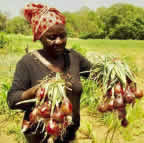 infrastructure, and farmer support such as training in System of Rice Intensification (SRI) and incentives such as rice production contests.
infrastructure, and farmer support such as training in System of Rice Intensification (SRI) and incentives such as rice production contests.Other 2019 news from Sierra Leone comes from the the NGO ENGIM Internazionale -- The ENGIM Newsletter #40 (Dec. 2019) reports that the Annual Chairperson's Award was given to Pa Foday Kanu of Medesora Village in Koya Chiefdom for his work with both SRI and Dream House Project. He was cited for his excellent leadership role in community development efforts in his village. Finally, with Gerald Aruna's assistance, ENGIM has secured a three-year project with the EU delegation in Sierra Leone that may include trials on the "System of Onion Intensification" that is based on System of Rice Intensification methods that have proven so valuable to ENGIM's rice production efforts. The project, which will involve three districts and begin in January 2020, is entitled "Establishing a sustainable, vibrant, competitive and profitable onion value chain primarily driven by producers and marketers in Sierra Leone."
2017
 Evaluations in the Mangrove Associated Swamps Assess Suitability and Profitability of SRI
Evaluations in the Mangrove Associated Swamps Assess Suitability and Profitability of SRI
[November 25, 2017] An article by Harding et al published in the journal Agronomie Africaine assesses SRI and conventional rice production methods on farmers' fields in locations in five districts of the Mangrove Associated Swamps (MAS) in Sierra Leone. The study was undertaken to determine SRI's effectiveness in increasing rice productivity and to assess the cost-benefit of the system. Three production practices involving conventional method, basic SRI and enriched basic SRI were evaluated. The enriched basic SRI gave an average yield that was actually three times greater than the average yield obtained with current farmer practices (6.2 and 2.0 t/ha). The basic SRI without any organic matter raised paddy yields by 60% over conventional methods, (3.2 and 2.0 t/ha, respectively). The number of tillers and panicles per square meter, the number of panicle per tiller, the number of grain per panicle and thousand-grain weight was highest for the enriched basic SRI. The economic analysis shows that shifting from conventional practice and basic to the enriched basic SRI practices is economical and rewarding. [See complete article for details: Assessing the suitability and profitability of the system of rice intensification (SRI) methodology under farmers’ circumstances in Sierra Leone.]
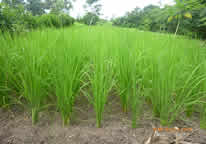
 SRI Project Implemented in Six Communities In Sierra Leone
SRI Project Implemented in Six Communities In Sierra Leone [June 30, 2017] Gerald Aruna, Country Director at ENGIM Internazionale - Sierra Leone, reports success in obtaining funding from Italy for an SRI project for six communities of Sierra Leone that will begin in July 2017. Major partners in the implementation will be the Ministry of Agriculture Forestry and Food Security ( MAFFS) in Portloko District and St. Joseph Vocational Institute (SJVI) Lunsar. The expected results of this one-year project include: 480 farmers trained in SRI method of rice cultivation (80 per community); a technical vocational school; a SRI manual for schools; innovative practices for nursery management, transplanting, cultivation, seed multiplication, and crop intensification introduced and acquired - with increased production by 30-50%; fifteen ha swamp area developed; three warehouses built and equipped with the necessary equipment for processing of agricultural products rice milling machine (with 50% reduction in post-harvest food losses); four water wells built with improved access to beneficiaries; 200 women trained in Moringa cultivation and utilization; four drying floors constructed for drying of farm products (with 25% reduction in drying time; and four fields agents trained. The project will be implemented in communities where ENGIM supports SILC (Savings and Internal Lending Community) groups actively working on agricultural income generating activities.
2016
 Krain Krain Leafy Vegetable Grown with System of Crop Intensification (SCI) Methods
Krain Krain Leafy Vegetable Grown with System of Crop Intensification (SCI) Methods
[December 7, 2016] Gerald Aruna, ENGIM Internazionale, has modified the traditional planting method for the local krain
 krain leafy vegetable (Cochorus Olitorius) to use System of Crop Intensification (SCI) methods. Called "SKKI" (System of Krain Krain Intensification), the modifications use: Less seeds, more organic matter, wide spacing between plants, transplanting of young seedlings between 8 to 15 days old, and overhead mulching (see photo at left). The crop is harvested twice, the first time by cutting / pruning branches of the plant at a point which leaves at least two other branches for fast re-growth and for collecting seeds at the end, so farmers can replant with their own seed. Weeding / earthing up / soil aeration of the crop is done every 7 days. This promotes robust root and
krain leafy vegetable (Cochorus Olitorius) to use System of Crop Intensification (SCI) methods. Called "SKKI" (System of Krain Krain Intensification), the modifications use: Less seeds, more organic matter, wide spacing between plants, transplanting of young seedlings between 8 to 15 days old, and overhead mulching (see photo at left). The crop is harvested twice, the first time by cutting / pruning branches of the plant at a point which leaves at least two other branches for fast re-growth and for collecting seeds at the end, so farmers can replant with their own seed. Weeding / earthing up / soil aeration of the crop is done every 7 days. This promotes robust root and 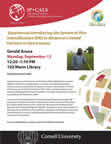 plant growth and results in robust leaves as well as very big pods of seeds at the end to be harvested. [See details.]
plant growth and results in robust leaves as well as very big pods of seeds at the end to be harvested. [See details.] Gerald Aruna Presents SRI Experiences in Sierra Leone at Cornell University Seminar
Gerald Aruna Presents SRI Experiences in Sierra Leone at Cornell University Seminar
[September 13, 2016] Gerald Aruna, Sierra Leone Country Director of the Italian NGO ENGIM Internazionale, presented a seminar entitled Introducing the System of Rice Intensification (SRI) to Resource-Limited Farmer in Sierra Leone, at Cornell University on September 12, 2016. Aruna, who is also a vocational agriculture instructor and a practicing farmer based in Lunsar in the Northern Province of Sierra Leone, relayed his insights on experimenting with SRI since 2002 and promoting the methods to surrounding communities beginning in 2006. (See PowerPoint presentation).
-
 World Bank gives SRI-WAAPP Highest Rating as SRI sites Expand in Sierra Leone
World Bank gives SRI-WAAPP Highest Rating as SRI sites Expand in Sierra Leone
[May 30, 2016] The project on Improving and Scaling up the System of Rice Intensification (SRI) in West Africa (SRI-WAAPP) has had continued success promoting the introduction, adaptation and scaling up of SRI in Sierra Leone since January 2014. SRI continues to expand in the areas of Sierra Leone where rice is cultivated, as can be seen in the SRI-WAAPP Sierra Leone site map to the right. The map, which is current as of 2016, shows over 40 sites where farmers have received training in SRI since the project formally began in 2014. A recent article on the Awoko website highlights the success of SRI-WAAPP in Sierra Leone, which received the highest rating provided by the World Bank.
2015
 Gerald Aruna and Mendesora United Featured in SRI Videos
Gerald Aruna and Mendesora United Featured in SRI Videos
[May 10, 2015] SRI-Rice has collaborated with Flooded Cellar Productions to produce two films on rainfed SRI in Sierra Leone: SRI in Sierra Leone - Mendesora United, a 13:10 min. video on the adoption of SRI in Mendesora village in northern Sierra Leone. A second , video, SRI in Sierra Leone - Gerald Aruna tells the story of Gerald Aruna, one of the earliest adopters of SRI in Sierra Leone. Both videos are available on YouTube SRI-Rice channel Africa playlist and the Flooded Cellar Productions System of Rice Intensification playlist.
 SRI Work Continues in Sierra Leone Despite Spread of Ebola
SRI Work Continues in Sierra Leone Despite Spread of Ebola
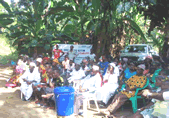
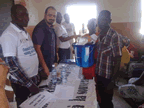 [January 28, 2015]
Gerald Aruna (second from left in photo at left), who has been an SRI promoter in the Northern Province for almost a decade, serves as the country director for the Italian NGO ENGIM Internazionale, working in the province from the Vocational Center of the St. Joseph Fathers in Lunsar.
He reported that SRI promotion efforts had to be adjusted to give priority to national and local efforts to stem the spread of the Ebola virus. In some of the communities with which he has been working on SRI demonstrations had been very seriously affected by the spread of the disease. In one community, Petifu Bana, in Buya Romende chiefdom in the Port Loko District, 67 people died and there were 22 survivors who came back from the Ebola treatment center.
[January 28, 2015]
Gerald Aruna (second from left in photo at left), who has been an SRI promoter in the Northern Province for almost a decade, serves as the country director for the Italian NGO ENGIM Internazionale, working in the province from the Vocational Center of the St. Joseph Fathers in Lunsar.
He reported that SRI promotion efforts had to be adjusted to give priority to national and local efforts to stem the spread of the Ebola virus. In some of the communities with which he has been working on SRI demonstrations had been very seriously affected by the spread of the disease. In one community, Petifu Bana, in Buya Romende chiefdom in the Port Loko District, 67 people died and there were 22 survivors who came back from the Ebola treatment center.
Gerald and associates have been providing medical supplies and personal protective equipment with support from Italian Cooperation funds. Social mobilization campaigns to contain the virus have been carried out in 40 communities, holding focus group discussions for community members of all ages and giving them Ebola virus disease (EVD) education. Gerald, who has been visiting new communities
 almost daily, says that where this education has been conducted, there have not been new cases of the disease. He writes that he has remained healthy and that, despite the EVD, preparations are being made to engage more communities this year in the expanding SRI campaign. (Click on pictures at left and right to see enlarged photos of the EVD social mobilization efforts.)
almost daily, says that where this education has been conducted, there have not been new cases of the disease. He writes that he has remained healthy and that, despite the EVD, preparations are being made to engage more communities this year in the expanding SRI campaign. (Click on pictures at left and right to see enlarged photos of the EVD social mobilization efforts.)
2013-2014 Updates
 SRI Adoption Increases as World Bank Project Scales Up SRI
SRI Adoption Increases as World Bank Project Scales Up SRI
[June 20, 2014] According to a June 19 World Bank article, about 10,865 Sierra Leone farmers have now adopted the SRI. SRI adoption is expected to increase in the coming years as the project Improving and Scaling up the System of Rice Intensification in West Africa gains momentum. The project is the first phase of a regional World Bank-financed project to increase rice productivity throughout a 13-country Economic Community of West African States (ECOWAS) area. The three year project, which includes Sierra Leone, is part of the larger West Africa Agricultural Productivity Program (WAAPP).
 Several Catholic Relief Services (CRS) Projects Integrate SRI Successfully
Several Catholic Relief Services (CRS) Projects Integrate SRI Successfully
[January 30, 2014] In March 2013, Gerald Aruna, Country Director for the Italian NGO ENGIM International, started the Swamp Development Project as a mixed rice and vegetable production system, using SRI rice followed by vegetables in an inland valley swamp system. Community members are being trained in surveying, SRI rice cultivation, and vegetable cultivation, while the project has also
 brought a community tool bank into existence. The 27 participating community members (17 men and 10 women) are part of a CRS-trained 'Savings and Internal Lending Community group'. Yields were being calculated as of January 2014 from their first season of trials.
brought a community tool bank into existence. The 27 participating community members (17 men and 10 women) are part of a CRS-trained 'Savings and Internal Lending Community group'. Yields were being calculated as of January 2014 from their first season of trials.-
Aruna has also been involved in providing Farmer Field School-based trainings for extension workers, farmers and CRS staff as the NGO incorporates SRI into their rice value chain work (Integrating Savings and Agricultural Development II) in the Kailahun and Koinadugu Districts, and with the Centre for the Coordination of Youth Activity (CCYA) in the Bombali District. The trainings took place at farmers' fields in Mendesora, and resulted in the publication of an SRI manual and a trainer guide by CRS, and the fabrication of six Mandava weeders. Aruna also authored a CRS training manual for facilitators which was used for the trainings.
 West African Rice Company (WARC) Integrates SRI into its Business Model
West African Rice Company (WARC) Integrates SRI into its Business Model
[January 30, 2014] The WARC was started in 2011 by two Argentinians who moved to Sierra Leone to build up the country's commercial rice sector as a means of alleviating poverty and reducing some of the damages inflicted from the civil war. Using modern technology and SRI, WARC works across the spectrum of rice farmers, including smallholder farmers, farmer cooperatives, and large-scale commercial farmers, providing trainings, technical assistance and loans for purchasing equipment to each actor in the value chain. As the value chain is strengthened Sierra Leone will be able to more effectively compete with low-cost rice imported from Southeast Asia. A video about Emiliano Mroue, one of WARC's founders, is available on YouTube. Directly below are photos of WARC taken by Erika Styger during her 2012 visit.
In early 2013, the WARC commissioned a study by Columbia University's School of International and Public Affairs (SIPA) to evaluate and give recommendations for their nascent outgrower development model. This approach is a key aspect of WARC's business and development models, whereby small-scale and large-scale farmers alike are integrated into the local rice value chain. (See SIPA report).
Daniel Saidu, chief agronomist for WARC, was trained in SRI in 2012, and in the Spring of 2013 traveled to Benin as a co-trainer for a regional West Africa SRI training for Peace Corps volunteers and staff, and counterparts working with the Peace Corps from Benin, the Gambia, and Senegal. In December 2013, Daniel acted again as trainer-- this time for the first national SRI training in Liberia, hosted by the Community of Hope Agriculture Project (CHAP) and sponsored by the West Africa Agricultural Productivity Program (WAAPP).
2012
 SRI Progress in Sierra Leone Noted at 2012 West Africa SRI Workshop in Burkina Faso
SRI Progress in Sierra Leone Noted at 2012 West Africa SRI Workshop in Burkina Faso
[July 30, 2012] Information on SRI in Sierra Leone was presented at a Regional Workshop on System of Rice Intensification of (SRI), which was held in Ouagadougou, Burkina Faso, on July 26 and 27, 2012. Sierra Leone was represented by Samuel Soki Harding, Daniel Santigie Fornah and Edward S. A. Kargbo at the workshop, which was organized by the West and Central African Council for Agricultural Research and Development (CORAF/WECARD), the National Center of Specialization for Rice (WAAPP Mali) and SRI-Rice (Cornell University) within the framework of the West Africa Agricultural Productivity Program (WAAPP); Oxfam America sponsored participation for civil society representatives.
The delegation from Sierra Leone reported in a PowerPoint presentation that detailed trials had been carried out in inland valley swamp areas of southern and eastern Sierra Leone in 2008. SRI methods were compared with currently-recommended practices and farmer practices. The results were as follows:
SRI Practices Recommended Practices Farmer Practices Yield (tons/ha 3.246 2.959 2.348 Gross revenue (000 Leones/ha) 4,870 4,438 3,523 Cost of production (000 Leones/ha) 720 870 800 Net income/ha (000 Leones) 4,150 3,568 2,723
SRI yield was 38% more than farmer practice, and 10% more than recommended practices; but because costs of production were lower (by 20%), net income/ha with SRI management was 53% higher than farmer practice and 17% higher than recommended practices.
2000-2006
 Mapity Farming Enterprise
Mapity Farming Enterprise
In 2002, Gerald Aruna, currently Country Director for the Italian NGO ENGIM International, began testing SRI in Buya Romended, Port Loko District, after receiving a copy of Teach yourself and others SRI from a Josephine priest. After several years of trials, including setbacks, Mr. Aruna's experience with SRI took a turn for the better when he received a cono weeder through CRS and the Niala School of Agric Technology, allowing him to tackle one of the primary obstacles to SRI adoption. In addition to his responsibilities with ENGIM International, Mr. Aruna farms his own 2 ha plot in Mabethor, Port Loko District, with SRI-grown rice in addition to raising poultry, pigs and goats, and teaches agriculture at the St. Joseph Vocational Institute.
 World Vision SRI Trials Show Promise for Sierra Leone Farmers
World Vision SRI Trials Show Promise for Sierra Leone Farmers
World Vision/Sierra Leone sent one of its agricultural staff to Madagascar in November 2000 to learn about SRI from Association Tefy Saina (see Sierra Leone report in Sanya conference proceedings). Upon his return to Sierra Leone, he trained World Vision staff on SRI, and they in turn informed villagers about it. From among volunteer villages, eight were chosen for the first trials, with 20 farmers from each village participating. The results were an average of 5.3 t/ha with SRI methods compared to 2.5 t/ha with their standard methods.
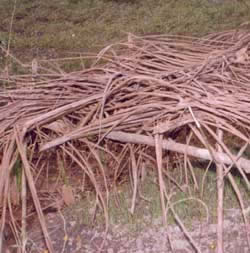 After the initial evaluations in 2001 and 2002, World Vision has been
expanding its dissemination of SRI with support from USAID. A February 6, 2004,
article in the Sierra Leone section of the USAID website describes how
farmers are getting 55-60 bushels of harvest from 6 kg of seed when planted and
raised with SRI methods, starting with 10-day-old seedlings. (The protected seedbed is shown at right). Encouraged by
positive farmer responses, other NGOs are taking up SRI dissemination in
cooperation with World Vision and USAID.
After the initial evaluations in 2001 and 2002, World Vision has been
expanding its dissemination of SRI with support from USAID. A February 6, 2004,
article in the Sierra Leone section of the USAID website describes how
farmers are getting 55-60 bushels of harvest from 6 kg of seed when planted and
raised with SRI methods, starting with 10-day-old seedlings. (The protected seedbed is shown at right). Encouraged by
positive farmer responses, other NGOs are taking up SRI dissemination in
cooperation with World Vision and USAID.Getting farmers to grow lowland rice rather than practice upland shifting cultivation has not been not easy, but the environmental damage to the uplands is affecting whole ecosystems and is important to stop, as well as to meet people's food security needs. Some SRI farmers are able to harvest 12 bushels of rice where they got 2 bushels before. Also, they are intensifying their production systems with vegetable rotations that improve the soil as well as diversify their diets.
Reports and Articles
- Borsari, B. 2025. Climate change education through agroecology curricula in Sierra Leone. In: Mbah, M.F., Molthan-Hill, P., Molua, E.L. (eds) Practices, Perceptions and Prospects for Climate Change Education in Africa. Springer, Cham. doi:10.1007/978-3-031-84081-4_13
- Kamara, Lamin Ibrahim, Baqir Lalani, and Peter Dorward. 2023. Towards agricultural innovation systems: Actors, roles, linkages and constraints in the system of rice intensification (SRI) in Sierra Leone. Scientific African 19: e01576. doi:10.1016/j.sciaf.2023.e01576
- 2024. Handing over ceremony of logistics atmerials and equipment to support RICOWAS field implementation in Sierra Leone. RICOWAS Project - SLARI, LinkedIn. May 30.
- Kamara, Lamin Alhaji. 2018. The use of agricultural innovation systems approaches in Sierra Leone: exploring perceptions on innovations in rice production, research and extension. PhD dissertation, University of Reading (UK). 445p.
- 2020. Five crops that are fighting poverty. The Borgen Project website. September 24. [Rice grown with SRI methods in Sierra Leone is highlighted.]
- Ratolojanahary, Marius. 2019. Sierra Leone: Boosting rice production is feasible. Shining Global Institute blog. December 22. [Author recommends SRI and incentives to boost rice production.]
- Harding, S. S. et al. 2017. Assessing the suitability and profitability of the system of rice intensification (SRI) methodology under farmers’ circumstances in Sierra Leone. Agronomie Africaine 29(1): 41-52.
- Aruna, Gerald. 2016. Conventional krain krain cultivation. SRI-Rice website. (2p, 942KB pdf) [Report by Gerald Aruna from the NGO ENGIM Internazionale about applying SCI principles to the local krain krain leafy vegetable in Sierra Leone.] [uploaded December 31, 2016]
- 2016. Sierra Leone News: WAAPP Sierra Leone attains highest World Bank rating. Awoko website. May 25.
- 2014. Sierra Leone farmers embrace SRI farming to reduce poverty. Oryza. June 20. [Oryza charges for subscription to view content].
- APA. 2014. W/Bank: About 10,865 Sierra Leone farmers adopt SRI, Star Africa, June 19. [10,865 Sierra Leone farmers have adopted SRI, which is also supported by the West Africa Agricultural Productivity Program (WAAPP) in Sierra Leone.]
- 2014. Agricultural program helps rice crops and food security grow in Sierra Leone. World Bank website, News section, Feature Story. June 18.
- 2014. SRI can boost rice yield by eight times in Sierra Leone, researchers say. Oryza website. February 14.
- Milton, Betty. 2014. As WAAPP introduces new type of rice planting… Farmers hope to produce more. Awoko website. February 13. [Oryza charges for subscription to view content].
- Harding, Samuel Soki. 2013. Assessing the suitability and profitability of the System of Rice Intensification Methodology under farmers’circumstances in Sierra Leone (2013-2014). SRI-WAAP website. December 3.
- Abdelrasoul, Ahmed, Abigail Childs et al. 2013. WARC: Pioneering high - yield rice production in Sierra Leone: Recommendations for an outgrower model. SIPA Columbia University website. May 13. [Report for the West Africa Rice Company in Sierra Leone by students from Columbia University's School of International and Public Affairs]
- ENGIM. 2012. SRI - (System of Rice intensification) in Sierra Leone - Sustainable crop production intensification, processing and marketing in Sierra Leone. Feeding Knowledge website. October. [ENGIM led project began in 2012 with partners SJFAP Sierra Leone, ENGIM Sierra Leone, CNS-RIZ-Mali, and Cornell University.
- Lartigue, Laura. 2004. New techniques improve rice farming in Sierra Leone. USAID - Sierra Leone website. February 6. [no longer online]
- Yamah, Abu. 2002. The practice of the System of Rice Intensification in Sierra Leone. Paper presented at the international conference on Assessments of the System of Rice Intensification (SRI), April 1-4, in Sanya, China.
Manuals and Practical Information
- Gerald Aruna and Mendesora United. 2013. System of Rice Intensification (SRI) - Achieving More with Less: A new way of rice cultivation: A manual for facilitators. System of Rice Intensification website. Hard copy published by CRS. (25p., 1.64MB pdf)
- Gerald Aruna. 2013. Facilitators Guide for Conducting Farmer Field Schools on SRI. SRI-WAAP website, originally published by CRS. [Also available from FAO FFS site.]
Presentations
- Aruna, Gerald. 2016. 1609 - Experiences Introducing the System of Rice Intensification (SRI) to Resource-Limited Farmers in Sierra Leone. 37 slides. Presentation by Gerald Aruna, ENGIM Sierra Leone Country Representative, at the SRI-Rice seminar series, Cornell University, Ithaca, NY, September 12. SRI-Rice channel, Slideshare.net.
- Experiences of the System of Rice Intensification in Sierra Leone
Powerpoint presented at the West Africa Regional SRI Workshop, Ouagadougou, Burkina Faso, July 26-27, 2012. 17 slides.
Videos
- Video: 2015 (May 12). SRI in Sierra Leone - Mendesora United. 13:10 min. FloodedCellar channel, YouTube. [Video on Gerald Aruna, an early adopter of SRI in Sierra Leone.]
- Video: 2015 (May 10). SRI in Sierra Leone - Gerald Aruna. 3:50 min. FloodedCellar channel, YouTube. [Video on adoption of SRI in Mendesora village in northern Sierra Leone.]
Photo Gallery
- Photos by Erika Styger during her 2012 visit to the West African Rice Company (WARC) in Sierra Leone.

